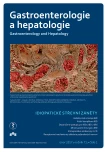Immunoglobulin G4-associated sclerosing cholangitis in a patient with Crohn’s disease
Authors:
J. Drahoš; P. Vyhnálek
Authors‘ workplace:
Interní oddělení, Pardubická nemocnice, Nemocnice Pardubického kraje, a. s.
Published in:
Gastroent Hepatol 2017; 71(1): 49-52
Category:
Hepatology: Case Report
doi:
https://doi.org/10.14735/amgh2016csgh.info14
Overview
The authors present the case of a 56-year-old patient treated for Crohn’s disease and primary sclerosing cholangitis (PSC). Histologic examination of a liver biopsy, which was performed to evaluate the advancement of liver disease, alerted us to the fact that the patient might have immunoglobulin G4-associated sclerosing cholangitis (IASC). We did not initially consider this disease because the patient lacked some of its characteristic features. He had not suffered from autoimmune pancreatitis and the development of liver disease was slow, with only a slow increase in serum concentrations of cholestatic enzymes. The onset of IASC is usually sudden with obstructive icterus. IASC usually presents in older patients, and its isolated occurrence without autoimmune pancreatitis is described in only 2% of patients. The coincidence of inflammatory bowel disease is also unusual for IASC. A high serum concentration of IgG4 is not sufficient to establish a diagnosis because it can be observed in patients with cholangiocellular cancer or PSC. IASC diagnosis is based on a combination of histological, imaging, biochemical, and clinical findings. However, there are no universally accepted diagnostic criteria. Crucial in our case was good clinical and laboratory response to the administration of corticosteroids, which is one of the essential features of imunoglobulin G4 associated diseases.
Key words:
immunoglobulin G – sclerosing cholangitis – Crohn’s disease
The authors declare they have no potential conflicts of interest concerning drugs, products, or services used in the study.
The Editorial Board declares that the manuscript met the ICMJE „uniform requirements“ for biomedical papers.
Submitted:
22. 6. 2016
Accepted:
9. 8. 2016
Sources
1. Nakazawa T, Naitoh I, Hayashi K et al. Diagnosis of IgG4-related sclerosing cholangitis. World J Gastroenterol 2013; 19(43): 7661 – 7670. doi: 10.3748/ wjg.v19.i43.7661.
2. Dítě P, Novotný I, Lata J et al. Autoimunitní pankreatitida a IgG pozitivní sklerotizující cholangitida. Vnitr Lek 2011; 57(3): 254 – 257.
3. Hubers LM, Beuers U. How to diagnose immunoglobulin g4-associated cholangitis: the jack-of-all-trades in the biliary tract. Viszeralmedizin 2015; 31(3): 185 – 188. doi: 10.1159/ 000431028.
4. Inoue D, Yoshida K, Yoneda N et al. IgG4-related disease: dataset of 235 consecutive patients. Medicine 2015; 94(15): e680. doi: 10.1097/ MD.0000000000000680.
5. Deshpande V, Zen Y, Chan JK et al. Consensus statement on the pathology of IgG4-related disease. Mod Pathol 2012; 25(9):1181 – 1192. doi: 10.1038/ modpathol.2012.72.
6. Zen Y, Nakanuma Y. IgG4 Cholangiopathy. Int J Hepatol 2012; 2012 : 472376. doi: 10.1155/ 2012/ 472376.
7. Zen Y, Kawakami H, Kim JH. IgG4-related sclerosing cholangitis: all we need to know. J Gastroenterol 2016; 51(4): 295 – 312. doi: 10.1007/ s00535-016-1163-7.
8. Oseini AM, Chaiteerakij R, Shire AM et al. The utility of serum immunoglobulin G4 in distinguishing immunoglobulin G4--associated cholangitis from cholangiocarcinoma. Hepatology 2011; 54(3): 940 – 948. doi: 10.1002/ hep.24487.
9. Mendes FD, Jorgensen R, Keach J et al. Elevated serum IgG4 concentration in patients with primary sclerosing cholangitis. Am J Gastroenterol 2006; 101(9): 2070 – 2075.
10. Ohara H, Okazaki K, Tsubouchi H et al. Clinical diagnostic criteria of IgG4-related sclerosing cholangitis 2012. J Hepato Biliary Pancreat Sci 2012; 19(5): 536 – 542. doi: 10.1007/ s00534-012-0521-y.
Labels
Paediatric gastroenterology Gastroenterology and hepatology SurgeryArticle was published in
Gastroenterology and Hepatology

2017 Issue 1
- Possibilities of Using Metamizole in the Treatment of Acute Primary Headaches
- Metamizole at a Glance and in Practice – Effective Non-Opioid Analgesic for All Ages
- Metamizole vs. Tramadol in Postoperative Analgesia
- Spasmolytic Effect of Metamizole
- The Importance of Limosilactobacillus reuteri in Administration to Diabetics with Gingivitis
-
All articles in this issue
- News in 2017
- Realist
- Czech Working Group for Paediatric Gastroenterology and Nutrition guidelines for diagnostics and treatment of inflammatory bowel diseases in children – 1stedition update
- The use of vedolizumab for the treatment of inflammatory bowel disease patients in the Czech Republic
- Possibilities of minimally invasive surgery in patients with Crohn’s disease and ulcerative colitis
- Ustekinumab – a new biologic drug for the treatment of Crohn’s disease
- Immunoglobulin G4-associated sclerosing cholangitis in a patient with Crohn’s disease
- Receptor mechanisms mediating activation of esophageal nerves by acid
- When is celiac disease not celiac disease?
- Are there any changes in the surgical management of stenosing rectal cancer?
- Looking back at the XVth intensive IBD course for doctors and nurses
- 14th Training and Discussion Gastroenterology Days
- The selection from international journals
- Ginkor Fort® with ginkgo biloba extract
- Intraoperative endoscopy is safe and helps to determine the resection extent in Crohn’s disease
-
Gastrointestinal infections
Herbert Tilg Lecture – Gastro Update Europe 2016, Prague
- Gastroenterology and Hepatology
- Journal archive
- Current issue
- About the journal
Most read in this issue
- When is celiac disease not celiac disease?
- Ginkor Fort® with ginkgo biloba extract
- Are there any changes in the surgical management of stenosing rectal cancer?
- Possibilities of minimally invasive surgery in patients with Crohn’s disease and ulcerative colitis
